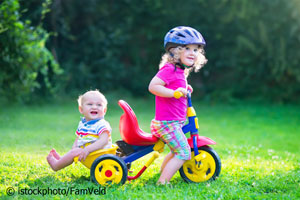The Benefits of Play
You know the plan for great nutritional health — stock up on fruits, vegetables, and whole grains and go easy on the fats and sweets. But what about physical and mental health? Boost your child's cognitive, language, physical, and social-emotional growth with a daily dose of play. Play is essential to healthy development! Read on to learn about the many benefits of play.

- Social-Emotional Development. Humans are social animals, and babies and toddlers crave strong connections with the adults in their lives. Developing trusting, securely-attached relationships will allow your child to explore her world confidently. Through playful experiences, she'll learn to trust you, read your facial expressions and body language, and deal with powerful emotions, including joy and frustration. These early lessons will shape her ability to understand herself and relate to others later. To boost social-emotional development, play silly games, such as tickling baby's tummy and/or blowing on her toes, and encourage independence whenever possible. Some great ways to do this are to let your toddler feed herself, allow time for creative or messy exploration, and show delight when she sticks with a task or solves a problem. Positive encouragement and activities like these can help your child develop a sense of pride and achievement and a stronger attachment with you.
- Cognitive Development. A newborn baby appears relatively helpless, but even young babies have powerful abilities. At three months of age, a baby can laugh, listen for sounds, recognize faces, and interact with other humans. Soon, they begin to move, using play to explore their world. They mouth toys, shake them, or bang them together. Later, toddlers use play to solve problems. They use toys functionally, such as building a tower of blocks or dumping and pouring water. These early play actions can build the skills necessary for symbolic thinking, a skill that doesn't fully develop until a child is around age six. Play activities that boost cognitive development include building with blocks, using cause-and-effect toys, creating works of art, stringing beads, playing with water, pretending, and reading.
- Language Development. From the earliest games of peek-a-boo to reading board books or playing pretend, play helps build language skills. Through play, your little one develops vocabulary and learns to ask questions and carry on conversations. Almost any play experience boosts language development, but some are particularly good, including pretend games, such as peek-a-boo and I Spy. Make it part of your everyday routine to talk to your baby about anything you are doing, read nursery rhymes and board books, and sing simple songs. Consider teaching your baby sign language for basic words, like drink or snack. Using sign language can help reduce frustration for pre-verbal children and actually encourage language development. Susan Goldin-Meadow, a researcher from the University of Chicago, found that children who use gestures at 14 months old had much richer vocabularies as preschoolers.
- Physical Development. As an adult, you probably go to the gym regularly or engage in some other type of exercise to keep your body healthy, but babies and toddlers have no concept of “fitness." They love movement and activity simply for the sheer joy of it! A young baby delights in squirming and kicking. Older babies scoot, crawl, and then walk. Finally, the busy toddler races down the sidewalk, rolls down hills, climbs up stairs, and hurdles over furniture. Whew! All this active play is hard work, but it serves a purpose: building gross motor skills. Play activities that promote physical development include gentle stretching, crossing-the-midline exercises, and tummy time for infants and scooting, running, climbing stairs, riding simple bikes, and jumping for toddlers. But don't forget fine motor development. Encourage older toddlers to string beads, use a spray bottle to water plants, transfer objects with tongs or tweezers, or play with craft dough.
Renowned teacher, Leila Gandini says in her book Insights and Inspirations from Reggio-Emila, “All children have preparedness, potential, and curiosity. They have interest in relationships, in constructing their own learning, and in negotiating with everything the environment brings to them." Offer a variety of play experiences every day to tap into this wonderful potential and set your child on a lifetime journey of exploration and discovery.
For more information:
- Cook, Susan W.; Mitchell, Zachary; and Goldin-Meadow, Susan (2002). Gesturing Makes Learning Last. Goldin-Meadow Laboratory, University of Chicago. Retrieved March 28, 2013, from http://goldin-meadow-lab.uchicago.edu/courses/psyc43700/02_Apr2/cook_et_al.pdf.
- Gandini, Lella; Etheredge, Susan; and Hill, Lynn (Eds.) (2009). Insights and Inspirations from Reggio Emilia: Stories of Teachers and Children from North America. Davis Publications.


